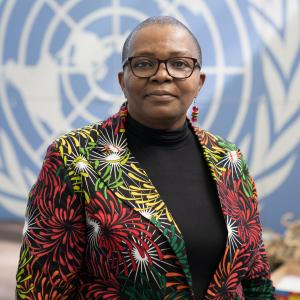The UN family is happy to join Ghana to celebrate this Day. This is an opportunity to call for more action to reduce risks of disasters in Ghana that impact on our communities and livelihood. While some of these disasters are brought on us by natural occurrences, there has been an increase in man-made actions.
Honourable Minister, distinguished ladies and gentlemen, as Ghana and the World celebrate this Day, I wish to re-echo the words of the UN Secretary-General that - it is only when we combine our efforts together that we are able to reduce systemic risk to meet the ‘21st century challenges and safeguard the lives, health and livelihoods of all people’.
Celebrating this Day gives us an opportunity to acknowledge the progress being made and review our efforts towards reducing disaster risk in our quest to protect humanity.
The covid-19 pandemic exposed the vulnerabilities in the global resilience system, most importantly the inadequate early warning and response system in developing, low and middle-income countries.
Amidst the impact of the pandemic and recovery efforts, the issues of weak governance, growing poverty, biodiversity loss, collapsing ecosystems and unplanned rapid urbanization across the world are all interconnected drivers of disaster risk.
If we don’t act now, we risk aggravating the intensity and frequency of disasters and increase the need for humanitarian assistance. We risk losing all the progress and gains we have made in the achievement of the SDGs when disaster strikes – a key lesson from the covid-19 pandemic.
This requires us to answer the question; h ow well is Ghana prepared to face impending disasters that usually come our way unannounced? Our analysis tells us that Ghana’s disaster and emergency situation, and other recurring crises present opportunities to deepen our partnerships and collaborative efforts towards having lasting solutions, particularly for the perennial flooding in the north, and various parts of the country, signals of potential earthquakes, and security threats from the Sahel.
Whilst acknowledging the ongoing efforts and commitment of NADMO in managing these disasters and emergencies, the perennial nature of emergencies suggest that a more robust and resilient system is required in Ghana.
It is therefore imperative that we leverage the whole-of-society approach to respond to the disasters and emergencies, as we continue to manage them in the short to medium term through our humanitarian efforts. This will require involving community structures in our preparedness and early warning systems in collaboration with the Ghana Meteorological agency.
In the words of the UN Secretary-General, “Building resilience to climate change and reducing disaster risk and losses is vital to save lives and livelihoods, eradicate poverty and hunger and achieve the Sustainable Development Goals” (UN SG).
It is in recognition of the fact that no single country has all the right solutions and resilient systems to mitigate the impact of disasters and emergencies, that UN Member States adopted the Sendai Framework in 2015 with one of the targets to enhance international cooperation for developing countries to reduce their disaster risk and disaster losses. As Ghana prepares to join the rest of the World at the COP 26 in Glasgow, it is important that it emphasises the cooperation it requires to enable it to reduce the frequency of occurrence and impact of such predictable disasters.
We must work together to rebuild sustainably, respond to the needs of the planet and protect lives.
As part of our humanitarian support, the UN Country Team, working together with development partners and the non-governmental organisations, continue to support the coordination efforts of NADMO on emergencies and disaster management, through our inter-agency coordination mechanisms.
The UN and partners across the development landscape are happy to continue our existing partnerships with the NADMO on the critical issues of emergencies and humanitarian needs, especially on the various programmes and interventions that contribute to Ghana’s capacity to respond to emergency and crisis situations.
I reiterate the assurance of the UN’s continuous support to NADMO and government in building greater resilience into planning and response systems and disaster risk reduction to respond to crises beyond the health pandemic.
Let me use this opportunity to call on all development partners, on this International Day for Disaster Risk Reduction, TO COMMIT TO COOPERATE to build a safer and more resilient Ghana.
It is only together that we can make true progress towards a safer and more resilient Ghana.
Thank you once again for the opportunity to be part of this celebration.









